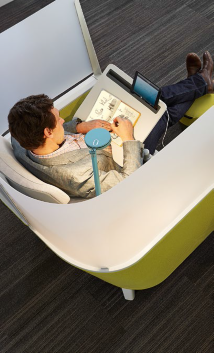

Erneut hat Leitz Andrew Crosthwaite, Mitbegründer von Futures House und Direktor für Strategische Planung bei BLAC Agency in London, beauftragt, sich mit der Zukunft unserer Arbeitswelt auseinanderzusetzen. Der thematische Schwerpunkt liegt in diesem Jahr auf dem Phänomen „Arbeiten jederorts“ („Working Everywhere“). Dabei haben wir sorgsam darauf geachtet, das Blickfeld nicht allein auf einen bestimmten Arbeitsplatz zu begrenzen – sei es nun das klassische Büro, das Home Office oder der inzwischen berüchtigte „dritte Ort“, das Café.
Heute gilt mehr denn je: Der Arbeitsplatz ist überall da, wo man arbeiten will. Und manchmal auch da, wo man eigentlich nicht arbeiten will.
Mehr erfahren und Leitz White Paper hier lesen.
Staying Powered Up
- 60% of business people totally run out of battery power at least once a month, and also 60% have to restrict their phone usage at some stage each month to conserve power. What about you?
The changing workplace
- The worker going to work is evolving to work coming to the worker.
- The end of the century saw the evolution of ‘hot desking’ as a familiar concept. But at that time, the technology wasn’t available to make it more than an internal ‘timeshare’ model whose primary benefit was to save space.
- With more and more people working remotely – from home, from customers’ premises or ad hoc on the road, as freelancers, or for themselves – the role of the traditional office will change. Having been originally designed for isolated, desk bound individual workers, the new era of smart working will see smart offices to cater for them
(Image source: 'The End of Sitting’ By RAAAF)
The Changing Company
- Some 90% of the media that Americans consume is in the control of just 6 organisations – GE, News-Corp, Disney, Viacom, Time Warner, and CBS. In 1983 it was 50 companies – and we are likely to see similar convergence in the rest of the world as digital and social media operate increasingly globally.
- In its 2013 report, “The Burdens of the Past” Deloitte notes that the average life expectancy of a Fortune 500 company has declined from around 75 years in the 1960s to less than 15 years today. Buyouts and mergers are partially responsible – but so are built-in complacency and inertia, leading to a failure to adapt to new circumstances in an accelerating world.